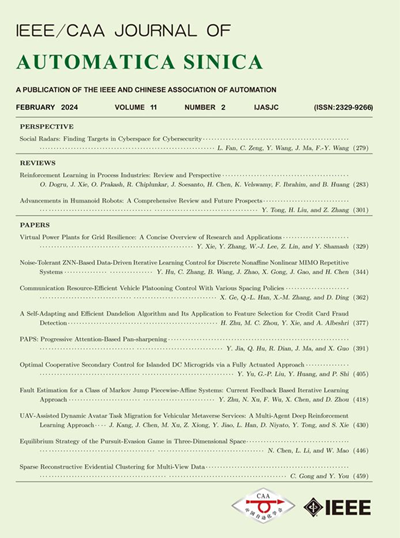An Online Exploratory Maximum Likelihood Estimation Approach to Adaptive Kalman Filtering
IF 15.3
1区 计算机科学
Q1 AUTOMATION & CONTROL SYSTEMS
引用次数: 0
Abstract
Over the past few decades, numerous adaptive Kalman filters (AKFs) have been proposed. However, achieving online estimation with both high estimation accuracy and fast convergence speed is challenging, especially when both the process noise and measurement noise covariance matrices are relatively inaccurate. Maximum likelihood estimation (MLE) possesses the potential to achieve this goal, since its theoretical accuracy is guaranteed by asymptotic optimality and the convergence speed is fast due to weak dependence on accurate state estimation. Unfortunately, the maximum likelihood cost function is so intricate that the existing MLE methods can only simply ignore all historical measurement information to achieve online estimation, which cannot adequately realize the potential of MLE. In order to design online MLE-based AKFs with high estimation accuracy and fast convergence speed, an online exploratory MLE approach is proposed, based on which a mini-batch coordinate descent noise covariance matrix estimation framework is developed. In this framework, the maximum likelihood cost function is simplified for online estimation with fewer and simpler terms which are selected in a mini-batch and calculated with a backtracking method. This maximum likelihood cost function is sidestepped and solved by exploring possible estimated noise covariance matrices adaptively while the historical measurement information is adequately utilized. Furthermore, four specific algorithms are derived under this framework to meet different practical requirements in terms of convergence speed, estimation accuracy, and calculation load. Abundant simulations and experiments are carried out to verify the validity and superiority of the proposed algorithms as compared with existing state-of-the-art AKFs.一种自适应卡尔曼滤波的在线探索性极大似然估计方法
在过去的几十年里,人们提出了许多自适应卡尔曼滤波器(akf)。然而,实现高估计精度和快速收敛速度的在线估计是具有挑战性的,特别是当过程噪声和测量噪声协方差矩阵都相对不准确时。极大似然估计(MLE)具有渐近最优性保证理论精度和对精确状态估计依赖性弱收敛速度快的特点,具有实现这一目标的潜力。遗憾的是,极大似然代价函数过于复杂,现有的最大似然代价函数方法只能简单地忽略所有历史测量信息来实现在线估计,无法充分发挥最大似然代价函数的潜力。为了设计在线估计精度高、收敛速度快的基于MLE的akf,提出了一种在线探索性MLE方法,并在此基础上开发了小批量坐标下降噪声协方差矩阵估计框架。在该框架中,最大似然代价函数简化为在线估计,在小批量中选择更少和更简单的项,并使用回溯方法计算。在充分利用历史测量信息的情况下,通过自适应探索可能估计的噪声协方差矩阵来回避最大似然代价函数。在此框架下,推导出四种具体的算法,以满足不同的收敛速度、估计精度和计算量的实际要求。进行了大量的仿真和实验,以验证所提出算法与现有最先进的akf相比的有效性和优越性。
本文章由计算机程序翻译,如有差异,请以英文原文为准。
求助全文
约1分钟内获得全文
求助全文
来源期刊

Ieee-Caa Journal of Automatica Sinica
Engineering-Control and Systems Engineering
CiteScore
23.50
自引率
11.00%
发文量
880
期刊介绍:
The IEEE/CAA Journal of Automatica Sinica is a reputable journal that publishes high-quality papers in English on original theoretical/experimental research and development in the field of automation. The journal covers a wide range of topics including automatic control, artificial intelligence and intelligent control, systems theory and engineering, pattern recognition and intelligent systems, automation engineering and applications, information processing and information systems, network-based automation, robotics, sensing and measurement, and navigation, guidance, and control.
Additionally, the journal is abstracted/indexed in several prominent databases including SCIE (Science Citation Index Expanded), EI (Engineering Index), Inspec, Scopus, SCImago, DBLP, CNKI (China National Knowledge Infrastructure), CSCD (Chinese Science Citation Database), and IEEE Xplore.
 求助内容:
求助内容: 应助结果提醒方式:
应助结果提醒方式:


